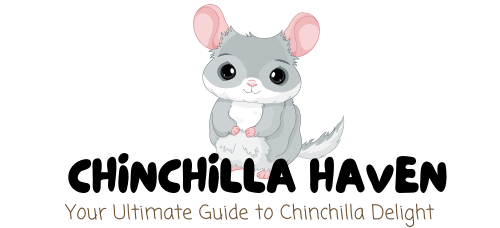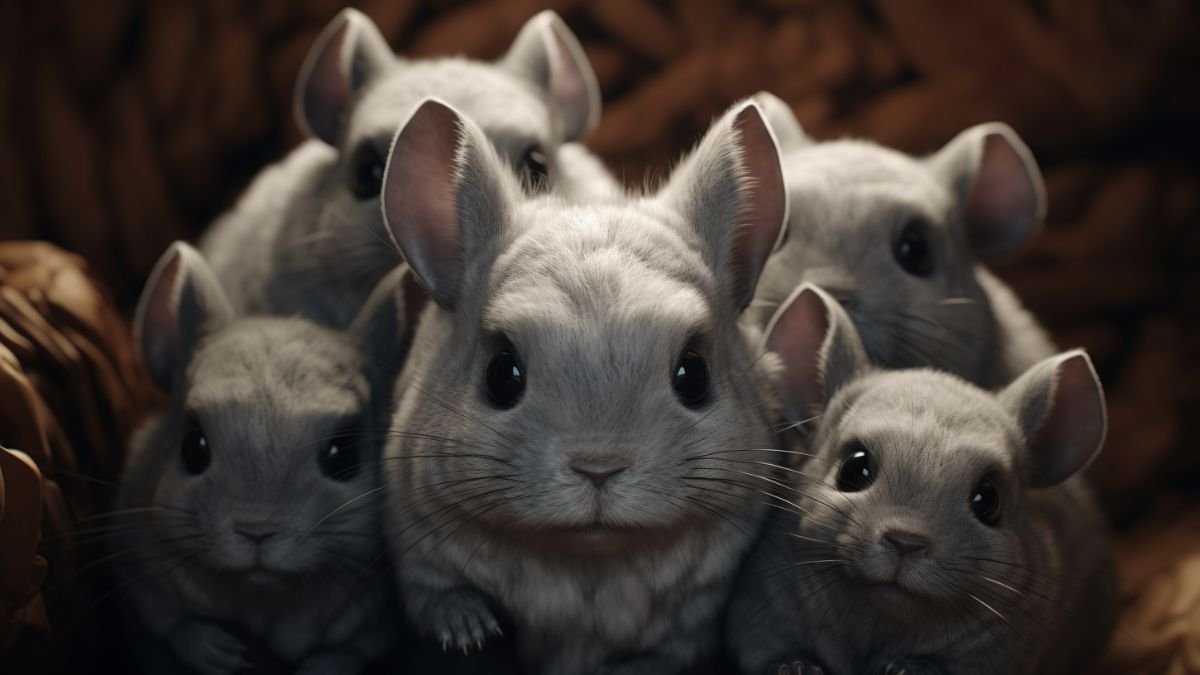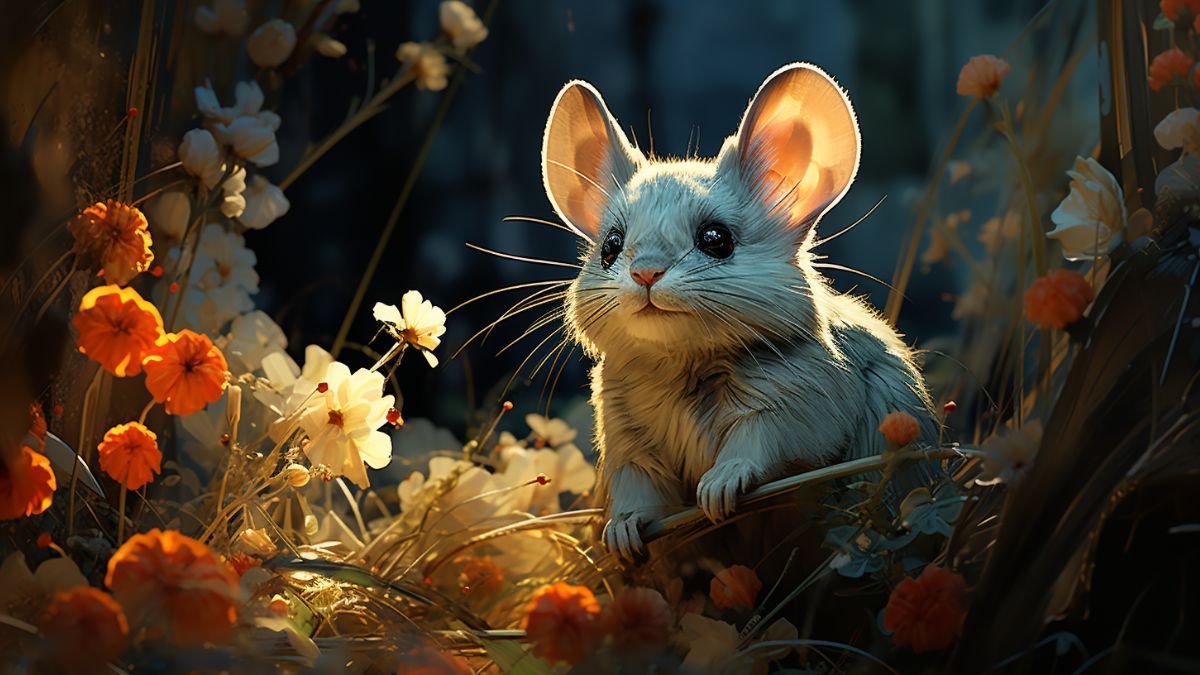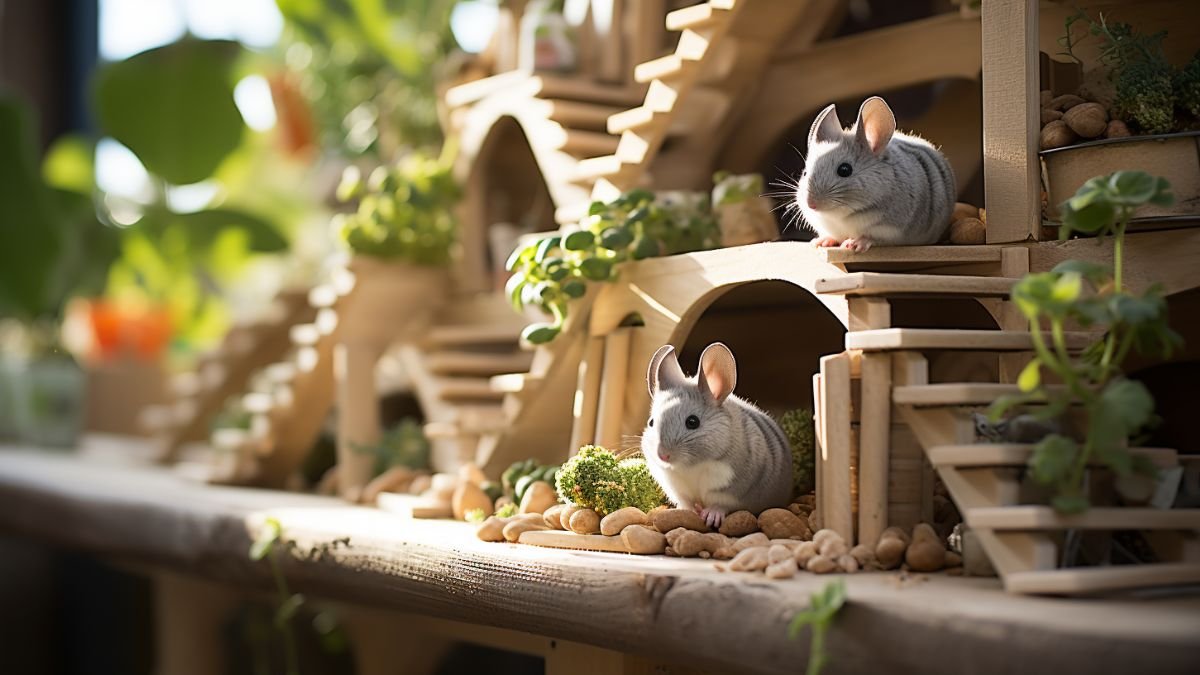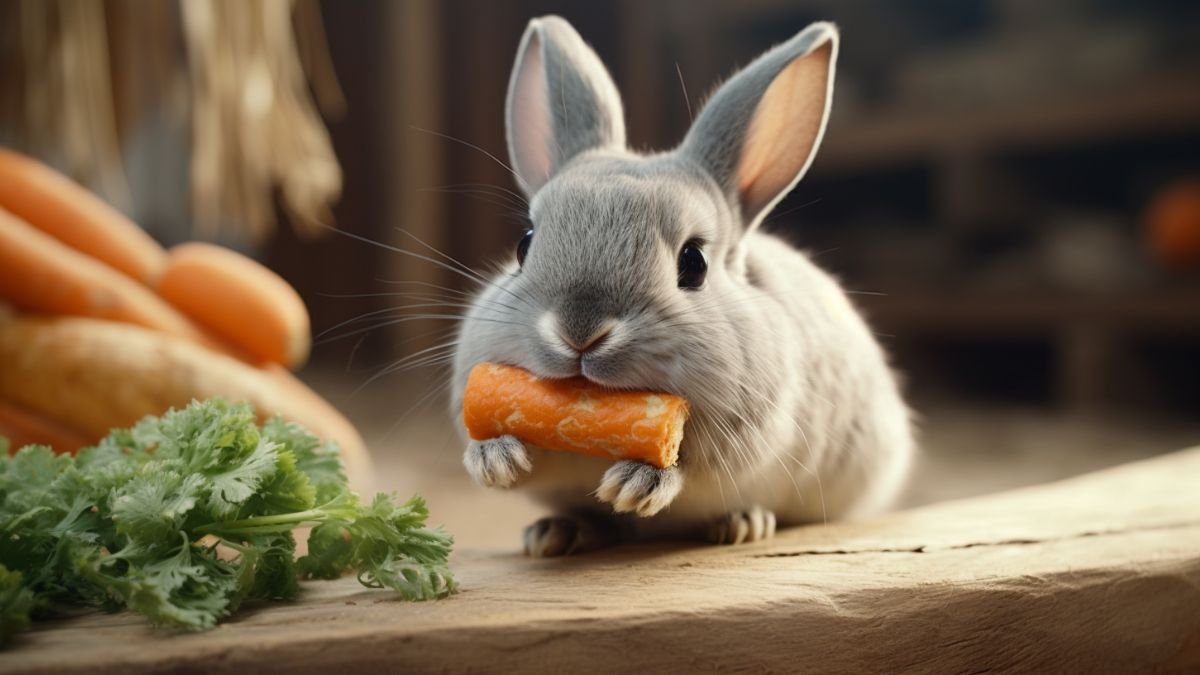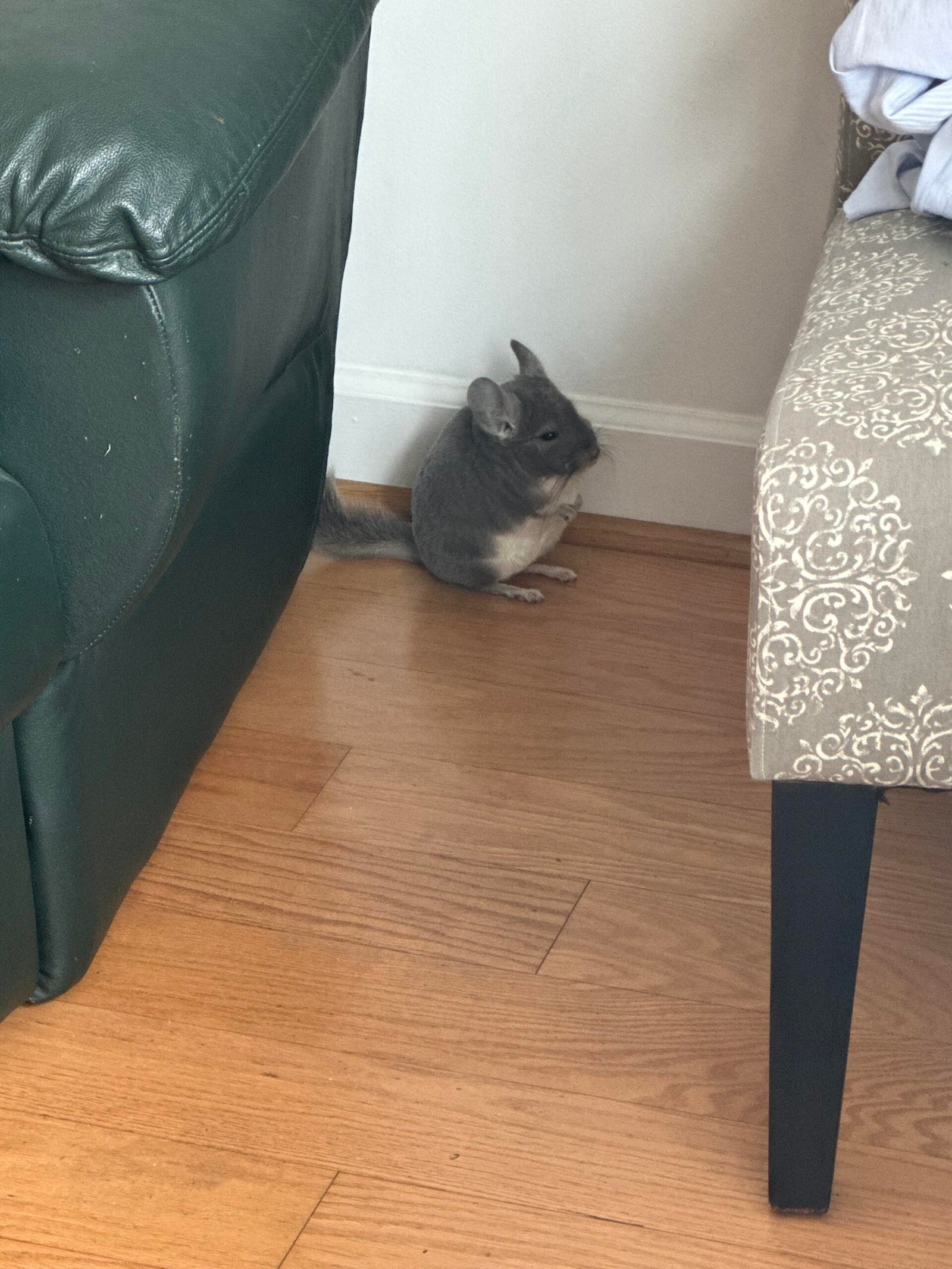
Is your chinchilla looking a bit rounder than usual? You might be wondering if your furry friend is carrying a little extra weight.
Knowing if your chinchilla is overweight is important because it affects their health and happiness. You’ll discover simple ways to check your pet’s weight and signs to watch for. By learning these easy tips, you can help your chinchilla stay fit and lively for years to come.
Keep reading to make sure your chinchilla is as healthy as possible!

Signs Of Overweight Chinchillas
Chinchillas are active creatures that need a healthy weight to stay happy. Watching for signs of overweight helps keep them safe. Overweight chinchillas can face health issues and shorter lifespans. Spotting early signs makes a big difference in care.
These signs are easy to notice. They help you understand your chinchilla’s health better. Knowing these signs lets you act quickly. Careful observation is key for a healthy pet.
Changes In Body Shape
An overweight chinchilla looks rounder than usual. The body appears wider and less defined. You may see fat deposits around the belly and sides. The spine and hips become harder to feel under the fur.
Less Activity And Playfulness
Overweight chinchillas move less than normal. They may avoid running or jumping. Playtime becomes shorter or less energetic. A drop in activity can signal extra weight.
Difficulty Grooming
Chinchillas with extra weight struggle to reach their fur. This leads to messy or oily patches. Grooming is important for chinchilla health and comfort. Poor grooming shows a possible weight problem.
Breathing Changes
Heavy chinchillas might breathe faster or harder. Shortness of breath can happen after small activity. Watch for noisy or labored breathing. These signs relate to extra weight stressing the body.
Changes In Eating Habits
Overweight chinchillas may eat more or less than usual. Some gain weight from overeating, while others eat less due to discomfort. Notice any sudden or slow changes in appetite. Eating habits reveal a lot about health.
Common Causes Of Weight Gain
Weight gain in chinchillas can happen for several reasons. Knowing these causes helps you keep your pet healthy. Some causes are related to diet, while others involve activity or health problems.
Understanding these factors helps prevent your chinchilla from becoming overweight. It also allows you to act early if weight gain starts.
Diet High In Sugars And Fats
Chinchillas need a balanced diet with low sugar and fat. Treats like nuts, fruits, or seeds can add extra calories. Feeding too many treats causes weight gain fast.
Lack Of Exercise
Chinchillas need daily exercise to stay fit. A small cage limits their movement. Without enough playtime or space, they burn fewer calories. This leads to extra weight over time.
Overfeeding
Giving too much food causes weight gain. Some owners feed large portions or offer food too often. Chinchillas eat small amounts regularly, so large meals can harm them.
Health Issues
Some health problems cause weight gain in chinchillas. Hormone imbalances or metabolic issues can slow metabolism. A vet check can find hidden health causes.
Ideal Weight Range For Chinchillas
Knowing the ideal weight range for chinchillas helps keep them healthy. Weight affects their energy and overall well-being. Too much weight can cause health problems and reduce their life span.
Chinchillas have a natural weight range that suits their size and body type. This range varies slightly by age and gender. Regular checks help spot any changes early.
Average Weight For Adult Chinchillas
Adult chinchillas usually weigh between 400 and 600 grams. Most healthy chinchillas fall within this range. Weighing your pet often shows if it stays inside this range.
Factors That Affect Chinchilla Weight
Age, diet, and activity level change a chinchilla’s weight. Younger chinchillas grow and gain weight naturally. Older chinchillas may lose weight or gain fat if inactive.
Signs Your Chinchilla Is Outside The Ideal Weight
Feeling the ribs helps check weight. Ribs should be felt but not seen. A chinchilla too light feels bony. Too heavy, the ribs get hard to feel under fat.

How To Weigh Your Chinchilla
Weigh your chinchilla using a small scale to check its weight regularly. Notice if it looks round or has difficulty moving. A chinchilla that is heavier than usual may be overweight and need a diet change.
Gather The Right Tools
Start by getting a small digital scale. A kitchen or postal scale works well. Make sure the scale shows grams or ounces. Avoid using large scales that measure pounds only. Your chinchilla is light, so precise measurement is key.
Prepare Your Chinchilla
Handle your chinchilla gently before weighing. Calm it down by petting softly. Avoid sudden movements or loud sounds. Place a small towel or cloth on the scale. This makes your chinchilla feel safe and comfortable.
Weigh Your Chinchilla
Place your chinchilla gently on the scale. Keep it still for a few seconds. Read the number carefully. If your chinchilla moves, try again. Take two or three measurements for accuracy. Write down the weight each time.
Record And Track Weight
Use a notebook or an app to record weight. Track your chinchilla’s weight weekly or biweekly. Notice any changes or sudden weight gain. Consistent tracking helps spot health problems early.
Body Condition Scoring Basics
Body condition scoring helps check your chinchilla’s weight health. It uses simple signs to see if your pet is too thin, healthy, or overweight. This method avoids guesswork and shows clear steps to know your chinchilla’s shape.
Use your hands and eyes to feel the chinchilla’s body. Look at bones and fat layers. This simple check helps stop weight problems early. It also guides you to feed and care better.
What Is Body Condition Scoring?
Body condition scoring is a way to rate your chinchilla’s weight. Scores usually go from 1 to 5 or 1 to 9. Low scores mean thin, middle scores mean good weight, and high scores mean overweight. This score shows how much fat covers the bones.
How To Feel Your Chinchilla’s Body
Gently touch your chinchilla’s ribs, spine, and hips. You should feel bones but not see them. If bones are hard to find, the chinchilla may be overweight. If bones stick out, your chinchilla could be too thin.
Signs Of A Healthy Weight
A healthy chinchilla has a smooth, rounded body. You can feel the ribs with light pressure. The spine is not sharp or sunken. The hips are soft, not bony or bulging.
Signs Your Chinchilla Is Overweight
Fat covers the ribs and spine strongly. The body looks round and thick. The chinchilla may move slowly or rest more. Overweight chinchillas have less energy and face health risks.
Diet Adjustments For Weight Control
Controlling your chinchilla’s weight starts with diet changes. Proper feeding keeps your pet healthy and active. You must adjust food types and amounts carefully. Balanced nutrition helps prevent obesity and related health problems.
Small, steady changes in diet work best. Sudden shifts can upset your chinchilla’s digestion. Focus on natural, low-fat foods that support weight loss. Avoid sugary treats and high-calorie snacks.
Reducing Pellet Portions
Pellets are the main food for chinchillas. Cut the daily amount gradually to reduce calories. Measure the food precisely to avoid overfeeding. Use a small scoop or scale for accuracy.
Offer pellets twice a day instead of free feeding. Controlled portions help maintain a healthy weight. Watch your chinchilla’s response and adjust portions as needed.
Increasing Hay Intake
Hay is vital for digestion and dental health. It contains low calories and high fiber. Offer unlimited fresh hay daily to fill your chinchilla’s stomach.
Hay helps your pet feel full without extra calories. Choose timothy hay or orchard grass for best results. Avoid alfalfa hay, which is too rich in nutrients.
Limiting Treats And Snacks
Treats should be rare and healthy. Many treats have hidden sugars and fats. Cut treats to a minimum or remove them completely.
Use small pieces of dried rose hips or plain oats for treats. Avoid sugary fruits, nuts, and seeds. Treat less often to support weight loss.
Safe Exercise Ideas For Chinchillas
Exercise is key to keeping your chinchilla healthy and fit. Safe activities help control weight and boost energy. Chinchillas need gentle, fun ways to move their bodies every day. Always watch your pet closely to avoid stress or injury.
Here are some easy and safe exercise ideas for your chinchilla.
Creating A Safe Play Area
Set up a quiet space free of hazards. Use soft mats or carpet to protect paws. Remove sharp or small objects your chinchilla could swallow. This space lets your pet explore and run safely.
Using Exercise Wheels
Choose a solid-surface wheel made for chinchillas. Avoid wire wheels that can hurt feet. Start with short sessions to build confidence. Always check the wheel for damage or noise.
Offering Climbing Opportunities
Provide shelves, ramps, and safe branches. Climbing strengthens muscles and keeps chinchillas active. Use non-toxic wood and secure all parts firmly. Change the setup often to keep your pet interested.
Supervised Floor Time
Let your chinchilla explore outside its cage daily. Stay nearby to prevent accidents or escapes. Use a playpen or small room for control. This time helps chinchillas stretch and use their natural curiosity.
Introducing Tunnels And Hideouts
Add tunnels and small boxes to the play area. These encourage movement and provide mental stimulation. Choose safe materials and clean regularly. Tunnels mimic natural burrows and keep your pet busy.
Health Risks Of Excess Weight
Excess weight in chinchillas can lead to serious health problems. Carrying extra fat puts stress on their bodies. Their organs and joints have to work harder. This can shorten their life and reduce their quality of life.
Understanding these risks helps you care for your chinchilla better. Watch for signs of weight gain. Act quickly to protect your pet’s health.
Respiratory Issues
Extra fat can make breathing difficult for chinchillas. Their lungs work less efficiently. This leads to shortness of breath and low energy. Over time, breathing problems can worsen and become dangerous.
Joint And Bone Problems
Weight puts pressure on chinchilla joints. This causes pain and stiffness. Walking and jumping become hard. Overweight chinchillas may develop arthritis early. Their bones can weaken and break easily.
Digestive Troubles
Too much weight can slow down digestion. Chinchillas may suffer from bloating and constipation. Digestive issues cause discomfort and reduce nutrient absorption. This affects their overall health and energy.
Reduced Mobility And Activity
Heavy chinchillas move less. They avoid exercise and play. Lack of activity worsens weight problems. This cycle leads to muscle loss and weakness. Active chinchillas stay healthier and happier.
When To See A Veterinarian
Knowing when to see a veterinarian is key for your chinchilla’s health. Overweight chinchillas face serious risks. A vet can help catch problems early. They provide the right care and advice.
Watch your chinchilla’s behavior and body closely. Some signs need professional attention fast. Don’t wait too long to get help. Early action makes a big difference in recovery and comfort.
Signs Your Chinchilla Needs A Vet Visit
Look for changes in activity levels. Less movement or difficulty jumping can signal weight issues. Notice any breathing problems or wheezing. These may relate to excess weight. Check for fur loss or skin problems. These can happen if your chinchilla is unhealthy.
Weight Checks And Health Exams
Regular weight checks are important. Sudden weight gain or loss needs a vet’s opinion. A vet can do a full health exam. They check teeth, fur, and body condition. This helps spot hidden health issues.
Behavior Changes To Watch For
Pay attention to eating habits. Overeating or refusal to eat can be a warning. Changes in bathroom habits matter too. Diarrhea or constipation are signs to consult a vet. Your chinchilla’s mood and energy also tell a lot.

Frequently Asked Questions
How Can I Tell If My Chinchilla Is Overweight?
Look for fat deposits around the neck, belly, and hips. The chinchilla will feel rounder than normal.
What Are Common Signs Of Chinchilla Obesity?
Slow movement, difficulty jumping, and less grooming can signal obesity in chinchillas.
How Much Should A Healthy Chinchilla Weigh?
Adult chinchillas usually weigh between 400 and 600 grams. Weight above this may indicate overweight.
Can Diet Cause Chinchilla Weight Gain?
Yes. Too many treats and high-fat foods can quickly make a chinchilla gain weight.
Is Lack Of Exercise A Factor In Chinchilla Obesity?
Yes. Chinchillas need daily exercise to stay fit and avoid becoming overweight.
How Often Should I Check My Chinchilla’s Weight?
Weigh your chinchilla once a week to monitor any sudden weight changes.
What Health Problems Come From An Overweight Chinchilla?
Obesity can lead to heart issues, joint pain, and shorter lifespan in chinchillas.
Can I Help My Chinchilla Lose Weight Safely?
Provide a balanced diet and increase exercise slowly. Avoid sudden diet or activity changes.
Conclusion
Watching your chinchilla’s weight keeps it healthy and happy. Check its body shape often and note any changes. A healthy chinchilla has a firm, well-defined body without extra fat. Balanced food and regular exercise help avoid weight problems. Small steps make a big difference in your pet’s life.
Stay patient and caring while monitoring its condition. Your chinchilla will thank you with playful energy and good health. Keep learning and caring for your furry friend every day.
